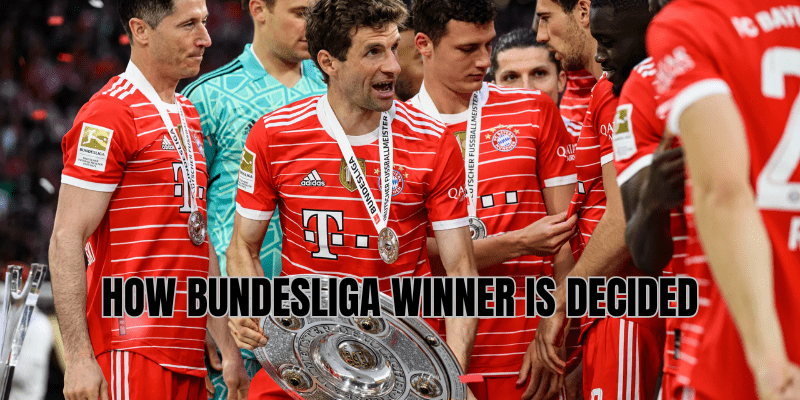The how Bundesliga winner is decided is simpler than many fans suspect—with pitfalls that can make title races dramatic and nail-biting. Below, ManoKick will guide you through the rules, tiebreakers, and scenarios that decide who lifts the Meisterschale (German championship trophy) each season.
How the Bundesliga season works

The Bundesliga is Germany’s top-flight football league. Here’s the format:
- There are 18 teams in the league.
- Each team plays every other team twice: once at home, once away. That makes 34 matchdays.
- Teams earn 3 points for a win, 1 point for a draw, 0 for a loss.
- At the end of the season, the team with the most points is declared champion. That is the primary criterion for how the Bundesliga winner is decided.
If a team leads clearly in points, that settles it. But when two or more teams are tied, that’s where tiebreakers come in.
What happens if teams finish level on points

When points alone don’t separate teams—maybe for first place, European qualification, or avoiding relegation—the Bundesliga applies a strict sequence of tiebreakers. ManoKick lays them out in order:
- Goal difference (overall)
- The difference between goals scored vs. goals conceded over all 34 games.
- Goals scored (overall)
- If goal difference is equal, the team that has scored more goals in total gets the advantage.
- Head-to-head results (points)
- Look only at matches between the tied teams. Who got more points in those direct encounters?
- Head-to-head goals scored
- If still tied, how many goals did each side score in those encounters?
- Head-to-head away goals scored
- Among the head-to-head matches, who scored more goals in away fixtures?
Overall away goals scored
- If all the head-to-head criteria fail to break the tie, look at total goals scored away. Playoff match at neutral site
- In the very rare case that all above are still tied, a single decider match may be required. So far in Bundesliga history, this has never been needed.
A recent Bundesliga title decided by tiebreaker

To see the rules in action, one of the most recent dramatic examples came in the 2022-23 season:
- Bayern Munich and Borussia Dortmund both ended the season level on points.
- Bayern clinched the title thanks to a superior goal difference.
This highlighted how important scoring lots of goals—and avoiding conceding—is, even early in the season. Every goal matters. Every match contributes.
Why these rules matter so much
These tiebreakers create incentives throughout the season:
- Teams are motivated not just to win, but to win big, and avoid heavy defeats.
- Away goals become valuable in head-to-head duels if things are tight.
- Every goal scored counts, even in matches where the outcome seems settled.
- The possibility (however slim) of a playoff adds tension—although it hasn’t happened yet.
Other related factors
A few more things to keep in mind when thinking about how Bundesliga winner is decided:
- Relegation & promotion operate slightly differently but use similar ranking rules if teams are tied in crucial spots.
- European qualification positions (Champions League, Europa League) also rely on the same tiebreaker hierarchy.
- The scheduling (home/away balance), defensive solidity, consistency: these all count because when title races are tight, you look back at goal difference, away goals, etc.
Conclusion
The how Bundesliga winner is decided comes down first to who amasses the most points over a 34-match season. When points are equal, a clear hierarchy of tiebreakers is applied. Only in an ultra-rare case would a playoff decide the champion—and it has never gone that far.
If you love football drama, these rules make the title race thrilling down to the final matchday—every goal, every defensive stop, every away game counts.
Curious about specific past seasons where these rules reshaped the championship? Or want to see which clubs have benefited most from tiebreakers? ManoKick can break that down next—just say the word.







